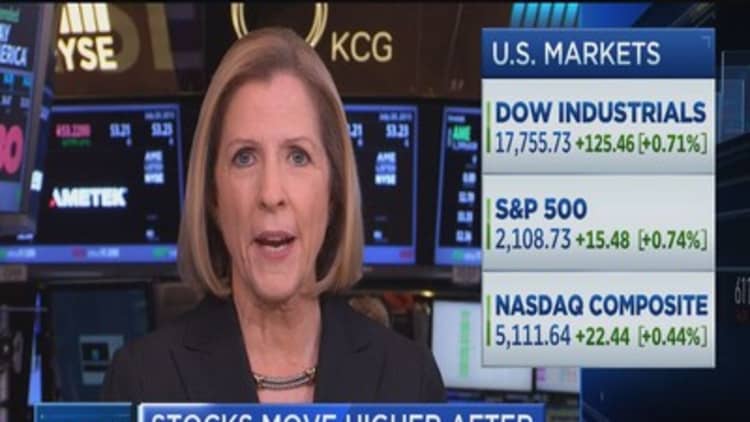
The Fed remains on track to hike interest rates this year, and the minor tweaks to its post-meeting statement were just vague enough to keep the debate going on when it will raise them.
Fed Chair Janet Yellen has said the central bank could boost its fed funds target rate for the first time in nine years sometime this year. Economists, by a slim margin, have been expecting the first increase in September, but others see a December hike.
In its statement, the Fed upgraded its view of the economy and labor, but left questions about the course of inflation, which is tracking weaker than the Fed would like.
"I don't think this change should affect anyone's thinking about when the Fed goes," said Ward McCarthy, chief financial economist at Jefferies. McCarthy expects the first hike in December.
However, Peter Boockvar of The Lindsey Group sees the first rise in September, and he believes the Fed confirmed that view with an upgrade of the language on labor.
Read MoreNot yet: Fed keeps rates at zero
Stocks were initially boosted and Treasury yields sank, suggesting a dovish statement. But Treasury yields reversed some of those moves, and stocks remained somewhat elevated.
The central bank noted that the economy is expanding moderately, dropping a reference to it being little changed in the first quarter. "The labor market continued to improve, with solid job gains and declining unemployment. On balance, a range of labor market indicators suggests that underutilization of labor resources has diminished since early this year," the Fed said.
"Assuming all else is equal, I think they're more likely to go in September based on their upgrade of the labor market," Boockvar said. "If you look at this statement and compare it to June, to me they're setting up for a September rate hike."
McCarthy noted that the Fed had blamed the decline in inflation in part on energy prices, and in its June statement said energy stabilized. However, oil has sold off since and it removed the reference to energy stabilizing.
He said that was a slightly dovish development. "They were rightly more optimistic about growth and they were less confident about inflation because they at least stopped claiming energy prices were stable. It was a split decision on the dual mandate," McCarthy said.
David Ader, chief Treasury strategist at CRT Capital, said the Fed did nothing to change the market debate on timing, though he expects the first hike in September.
Strategists pointed to the addition of the word "some" in a sentence where the Fed described the further improvement it would like to see in labor and inflation before raising rates. Ader saw that as a slightly hawkish tempering of the language.
The Fed statement said: "The Committee anticipates that it will be appropriate to raise the target range for the federal funds rate when it has seen some further improvement in the labor market and is reasonably confident that inflation will move back to its 2 percent objective over the medium term."
"This is nuanced and the Fed doesn't do this glibly in terms of changing their language. When they add something, they add something," said Ader. "On the inflation front, it's a little bit more dovish. But I think the labor side is more interesting. That's been their focus."
Deutsche Bank's chief U.S. economist, Joseph LaVorgna, also said the addition of the word "some" was important.
"Some further is less than further," said LaVorgna. "These little tiny tweaks certainly suggest they want to raise rates. I don't think they decided which meeting it is. To them it's a tossup—September or December. This is very much in line and consistent with what Yellen has said and the Fed has said."
LaVorgna said the Fed made it clear that it wants to raise rates, and that it would base its decision on the economy. "The data now is very important.," he said. "If we get another month were jobs are over 200,000 and the employment rate slips, that's enough for me to think they go in September."


